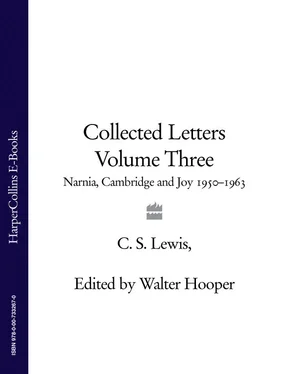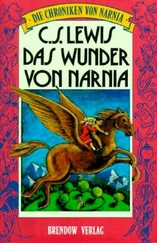*Please forgive. The smudge has a long and complicated history, if you but knew. First I always was a clumsy brute: ten thumbs and not a finger among them. 296
TO J. KEITH KYLE (BBC): 1 TS
REF.3/53.
Magdalen College,
Oxford.
1st January 1953.
Dear Mr. Kyle,
I wish the series every success, but am snowed under with work at present, and cannot assist: anyway, if the public does’nt by now know what I believe I should’nt enlighten them much in 3 1/2 minutes more!
Yours sincerely,
C. S. Lewis
TO RUTH PITTER(BOD):
Magdalen College,
Oxford.
Jan 2nd 1953
Dear Miss Pitter–
The year, which I had not thought much of so far, begins to mend with a letter and a prime article from you. And then, as you say, the skies.
It was beautiful, on two or three successive nights about the Holy Time, to see Venus and Jove blazing at one another, once with the Moon right between them: Majesty and Love linked by Virginity—what could be more appropriate?
The Return to Poetic Law is a noble piece and would do good if any of those who most need it were at all likely to take any notice. 2 But they are all in Groups and Parties. What matters to them is not what is said but who says it: one of the Party or an outsider. ‘A minor specialist’s subject’, as you say. Yet some one or two may heed you: you are right to testify.
I do most heartily agree with you about having had too much shame. (Do you, by the way, remember the character-study of Shame in the Pilgrims Progress , all in a conversation between Christian and Hopeful? 3 It is superb fun). It is v. sinister that ‘embarrassing’ or ‘embarrassingly bad’ has become an ordinary term of criticism: this, you see, is a direct appeal away from the reader’s consciousness of the poem to his social self-consciousness. While he reads he must be aware that the set are watching him reading.
That is a bad business, losing your country home. I have lost mine while remaining in it, i.e. it has ceased to be country. Not that I’d quite say ‘All things are taken from us and become Parcels and portions of the dreadful past’. Dreadful isn’t the word at all. But it’s thrilling to hear of your ‘closing in on’ Oxford. 4 It wd. be lovely if you became a neighbour.
My brother joins me in best wishes for the year. How many—and how few—of these here years there seem to be!
Yours sincerely
C. S. Lewis
During her weeks at The Kilns Joy Gresham received a letter from her husband, Bill, saying that while he knew Joy would never be anything but a writer, ‘Renée has a different orientation: her only interest is in taking care of her husband and children and making a home for them.’ The ‘optimum solution, as he saw it, ‘would be for you to be married to some swell guy, Rene and I to be married, both families to live in easy calling distance so that the Gresham kids could have Mommy and Daddy on hand.’ 5
Joy showed this letter to Lewis and she told Chad Walsh that she asked him for advice. ‘He strongly advised me to divorce Bill,’ she said. 6 After a fortnight at The Kilns, Joy returned to the United States on 3 January
TO DON GIOVANNI CALABRIA (V): 7
Collegium Stae Mariae Magdalenae
apud Oxonienses
Vig. fest. Trium Regum
MCMLIII [5 January 1953]
Dilectissime Pater
Grato animo, ut semper, paternas tuas benedictiones accepi. Sit tibi, precor, suavissima gustatio omnium hujus temporis gaudiorum et inter curas et Dolores consolatio. Tractatum Responsabilità apud Amicum (Dec.) invenire nequeo. Latet aliquis error. Orationes tuas peto de opera quod nunc in manibus est dum conor componere libellum de precibus privatis in usum laicorum praesertim eorum qui nuper in fidem Christianam conversi sunt et longo stabilitoque habitu orandi adhuc carent. Laborem aggressus sum quia videbam multos quidem pulcherrimosque libros de hac re scriptos esse in usum religiosorum, paucos tamen qui tirones et adhuc (ut ita dicam) infantes in fide instruunt. Multas difficultates invenio nee certe scio utrum Dominus velit me hoc opus perficere an non. Ora, mi pater, ne aut nimia audacitate in re mihi non concessâ persistam aut nimia timiditate a labore debito recedam: aeque enim damnati et ille qui Arcam sine mandato tetigit et ille qui manum semel aratro impositam abstrahit.
Et tu et congregatio tua in diurnis orationibus meis. Haec sola, dum in via sumus, conversatio: liceat nobis, precor, olim in Patria facie ad faciem congredi. Vale.
C. S. Lewis
Adhuc spero tractatum Responsabilità accipere.
*
The College of St Mary Magdalen, Oxford
n Vigil of the Feast of the Three Kings, 1953
[5 January 1953]
Dearest Father
Thank you, as always, for your fatherly blessings.
May you, I pray, have the sweetest relish of all the joys of this life and consolation amid cares and griefs.
I am unable to find the article ‘Responsibility’ in the December issue of Friend . There is some unexplained mistake here. 8
I invite your prayers about a work which I now have in hand. I am trying to write a book about private prayers for the use of the laity, especially for those who have been recently converted to the Christian faith and so far are without any sustained and regular habit of prayer. I tackled the job because I saw many no doubt very beautiful books written on this subject of prayer for the religious but few which instruct tiros and those still babes (so to say) in the Faith. I find many difficulties nor do I definitely know whether God wishes me to complete this task or not. 9
Pray for me, my Father, that I neither persist, through over-boldness, in what is not permitted to me nor withdraw, through too great timidity, from due effort: for he who touches the Ark without authorization 10 and he who, having once put his hand to the plough, draws it back are both lost. 11
Both you and your Congregation are in my daily prayers. While we are in the Way, this is our only intercourse: be it granted to us, I pray, hereafter, to meet in our True Country face to face.
C. S. Lewis
I still hope to receive the article ‘Responsibility’.
TO DON GIOVANNI CALABRIA (V):
e Coll. Stae Mariae Magdalenae
apud Oxonienses
Jan. vii. MCMLIII
Tandem, pater dilectissime, venit in manus exemplar Amid (Oct.) quod continent tractatum tuum de clade illa Serica. De illa natione quum ibi per multos annos evangelistae haud infeliciter laboravissent, equidem multa sperabam: nunc omnia retro fluere, ut scribis, manifestum est. Et mihi multa atrocia multi de illa re epistolis renuntiaverunt ñeque aberat ista miseria a cogitationibus et precibus nostris. Neque tamen sine peccatis nostris evenit: nos enim justitiam illam, curam illam pauperum quas (mendacissime) communistae praeferunt debueramus jam ante multa saecula rê verâ effecisse. Sed longe hoc aberat: nos occidentales Christum ore praedicavimus, factis Mammoni servitium tulimus. Magis culpabiles nos quam infideles: scientibus enim volunta-tem Dei et non facientibus major poena. Nunc unicum refugium in contritione et oratione. Diu erravimus. In legendo Europae historiam, seriem exitiabilem bellorum, avaritiae, fratricidarum Christianorum a Christianis persecutionum, luxuriae, gulae, superbiae, quis discerneret rarissima Sancti Spiritus vestigia? Oremus semper. Vale.
C. S. Lewis
*
from The College of St. Mary Magdalen
Oxford
Jan 7th 1953
At last, dearest Father, there has come to hand that copy of Friend (Oct.) which contains your article on that Chinese disaster. I used myself to entertain many hopes for that nation, since the missionaries have served there for many years not unsuccessfully: now it is clear, as you write, that all is on the ebb. Many have reported to me too, in letters on this subject, many atrocities, nor was this misery absent from our thoughts and prayers. 12
Читать дальше












